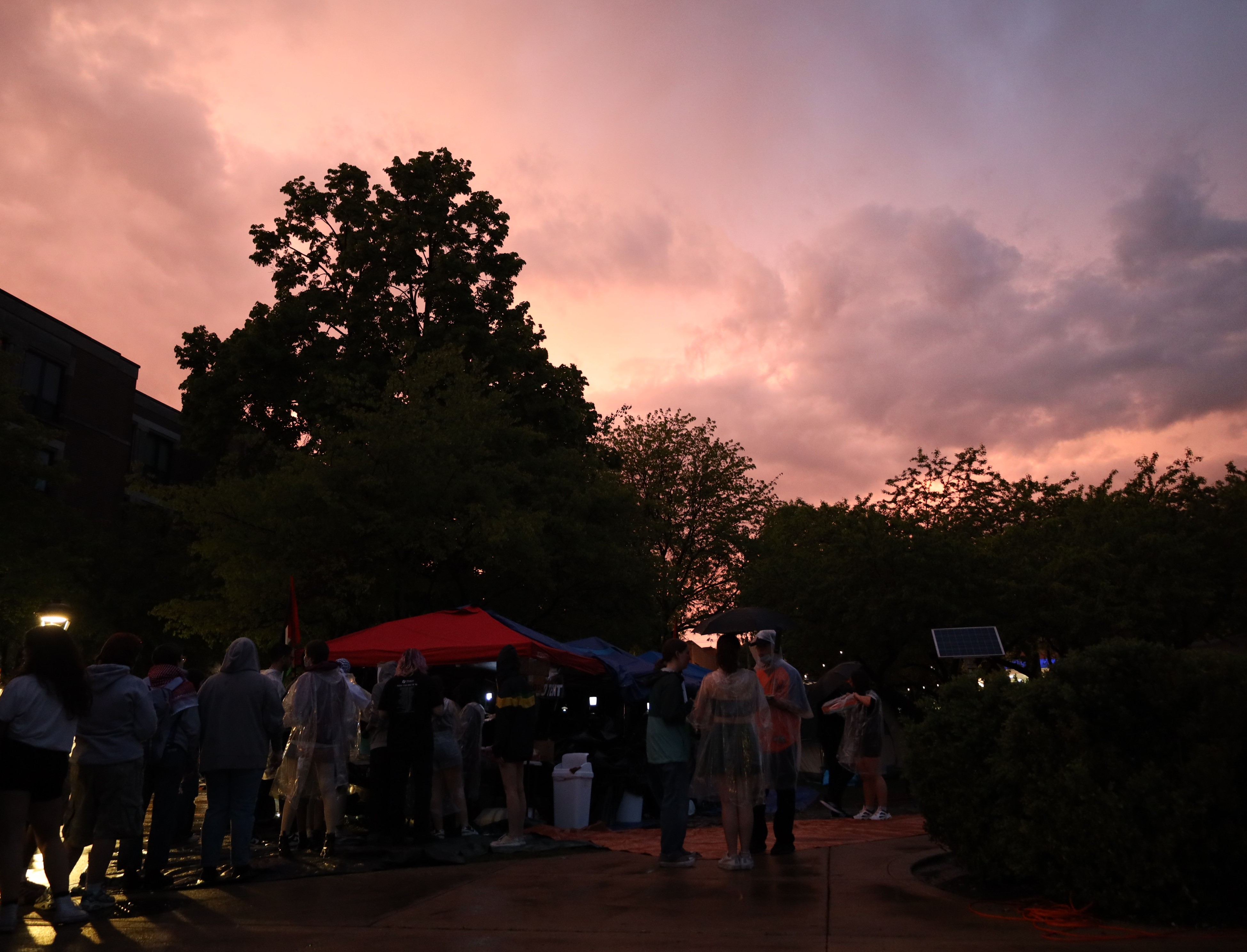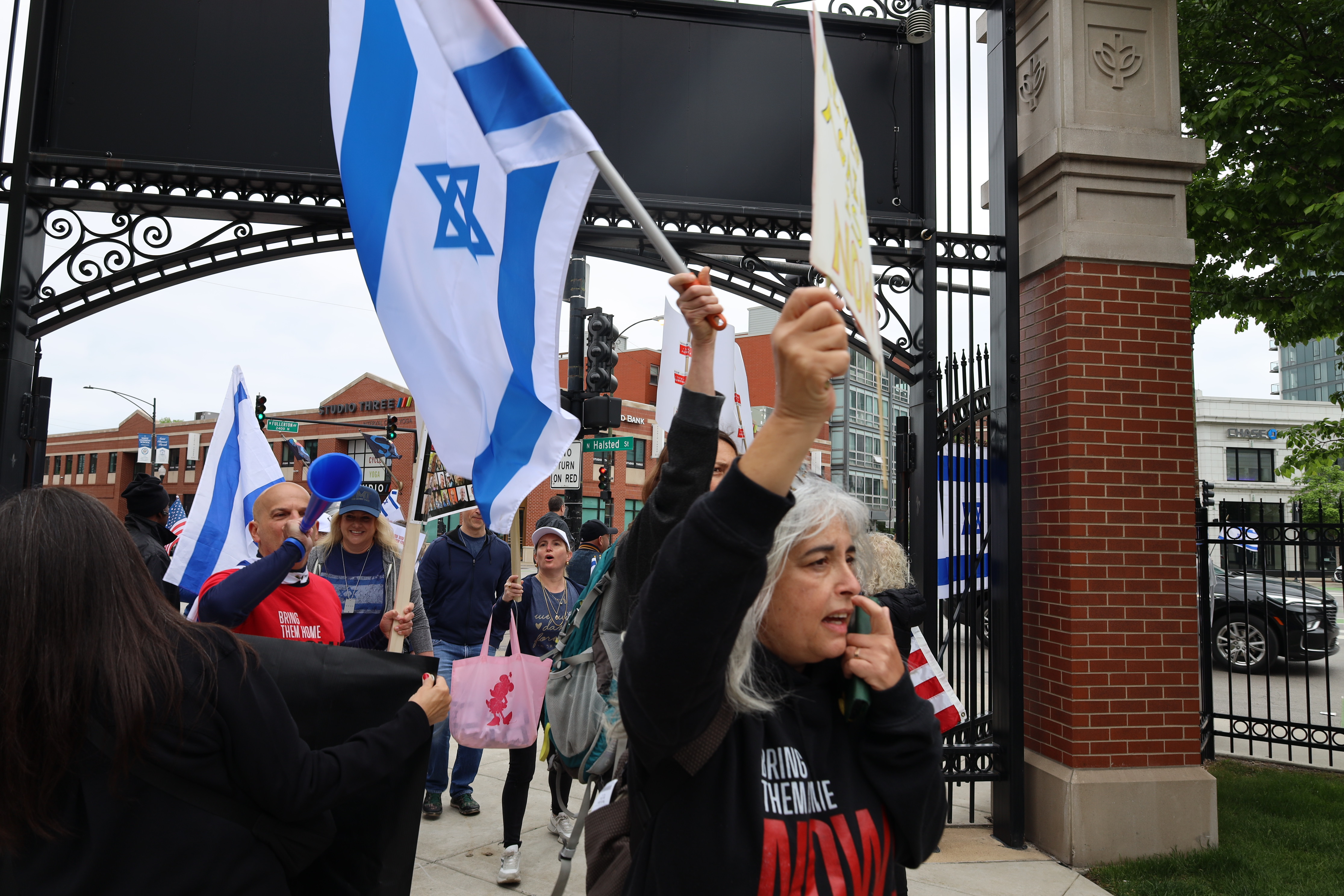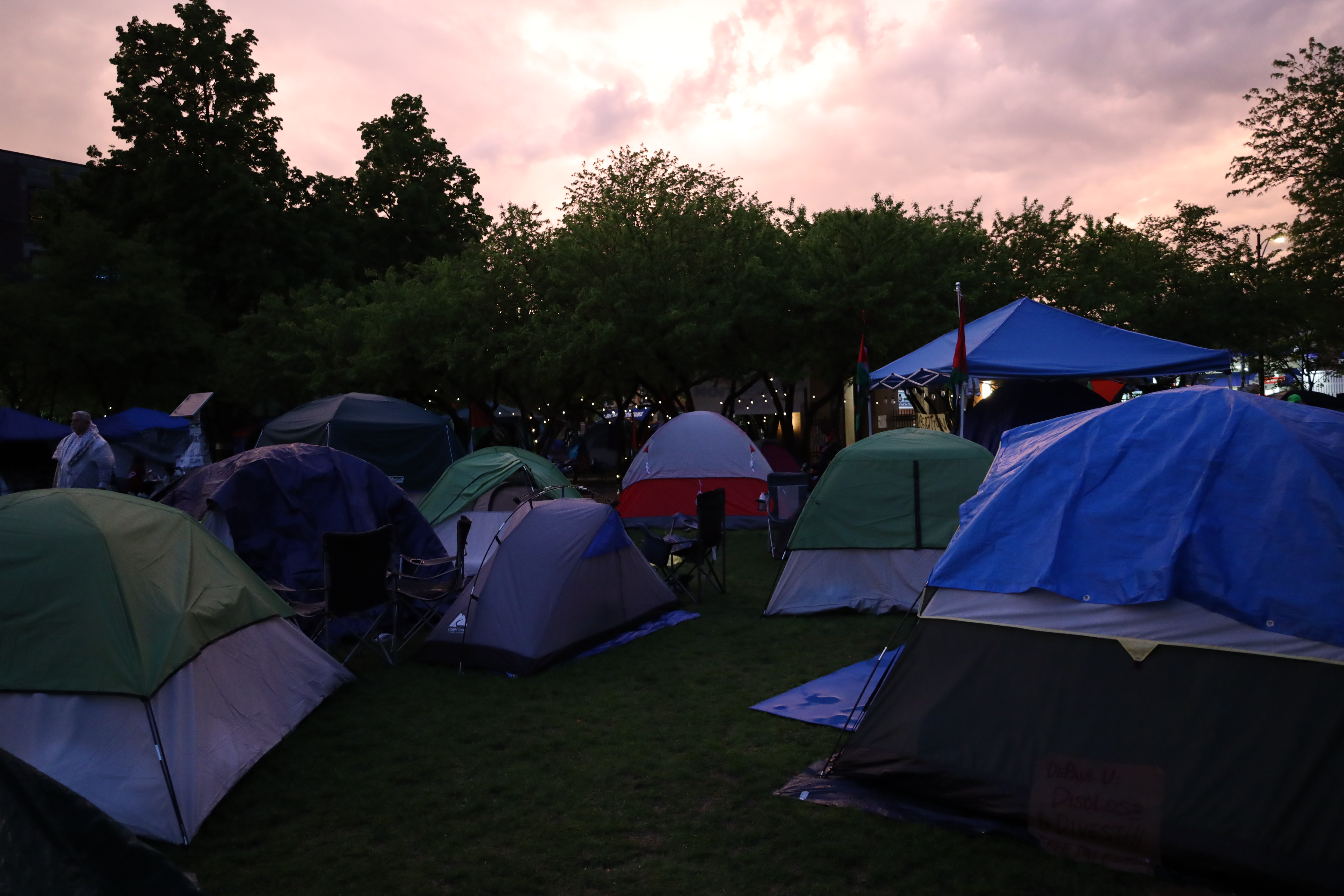The sequence of events after DePaul students set up an encampment on April 30, 2024.

Student line up for dinner time. All of the resources for camps are donated. Photo by Hailey Bosek
14 East management have been covering the DePaul encampment over the last week since DePaul University students and organizers first set up tents across the Lincoln Park Campus Quad. Here is a timeline of information we have on the ongoing encampment so far.
Around 10 a.m. on Tuesday, April 30, DePaul students who are members of the DePaul Divestment Coalition swiftly set up an encampment demanding that DePaul University divest from and cut ties with Israel.
According to a joint Instagram post made by SJP DePaul, AMP Chicago and the DPU Divest Coalition, this encampment will remain until their demands are met by the DePaul administration. The demands are also outlined on the SJP Instagram. They include labeling the Israel-Palestine conflict a genocide, joining the city of Chicago in calling for a ceasefire, establishing an ethical advisory team on investment responsibility, creating an Arab/Swana student center and providing amnesty to protestors.
This encampment follows University of Chicago students setting tents up a day prior along with other demonstrations in Chicago and around the country.
Hamas, which controls Gaza, attacked Israel on Oct. 7, killing an estimated 1,200 Israelis and taking around 240 people hostage. The Israeli military has since conducted more than six months of military action in Gaza, including large-scale airstrikes and raids. More than 34,500 people have been killed in Gaza, including more than 13,000 children, according to Palestinian health officials. The United Nations says “hundreds of thousands” more could die if Israel goes forward with a planned invasion of the city of Rafah.
Following the creation of DePaul’s encampment, the office of President Robert L. Manuel sent out an email acknowledging the demonstration while urging students to remain peaceful.
“Again, peaceful protest long has been a legitimate means of expression at DePaul,” the email read. The email also stated that any actions of violence, harassment or intimidation would result in disciplinary action, which could include suspension or expulsion.
Originally, over 100 students took part in setting up the encampment on the quad, but this number has since grown during the past week to around 300. Some faculty, staff members and people from outside the university have also joined students in protesting on the quad.
One group of faculty members had pins that said, “I work for the students, not the endowment.”
“It’s long overdue, but I’m so glad that students took this initiative,” said Kaveh Ehsani, associate professor of international studies.
Associate Professor of English Marcy Dinius said some faculty sent an open letter to President Manuel and Provost Salma Ghanem on April 29, urging DePaul administration to keep students safe. The letter has since collected 133 signatures from DePaul faculty and staff as of May 4, according to an Instagram post by DePaul Faculty for Justice in Palestine.
On Thursday, media representatives for SJP Henna Ayesh and Yasmine, who did not want to disclose her last name for safety reasons, said since the encampment started, the DPU Coalition have met with administrators a total of two times.
The first meeting was held on Tuesday, and the second took place on Wednesday afternoon.
Ayesh and Yasmine said after both meetings, they still felt their demands were still not being met by the DePaul administration.
“We requested someone from the Board of Trustees to be there and they didn’t do that,” said Ayesh.

The Chicago Jewish Alliance held a rally on May 5, 2024, at the DePaul School of Music. Photo by Alexandra Murphy.
On Sunday morning at 10:30 a.m, The Chicago Jewish Alliance held a rally at the DePaul School of Music in response to the encampment. At the rally, there was a mix of students, faculty members and other counter-protesters in support of Israel.
Professor Steve Resnicoff, who teaches in the College of Law and is director of its Center for Jewish Law and Judaic Studies, said there has been some harassment of Jewish students on campus. He said he was attending the rally to show that they are not alone.
“There’s been increasing feelings of alienation and isolation by many of our students who have said there has been threats and harassment,” said Resnicoff.
Shortly after the rally started, counter-protesters were lined along the sidewalk on Fullerton Avenue outside of the quad, with the Chicago Police Department showing up on Fullerton Avenue to intervene while the dueling groups chanted and fought back and forth. It was not clear whether members of the rally at the music school were part of the crowd. At one point, a counter-protester holding a pole started forcing his way forward through the barrier of cops, attempting to hit those taking part in the encampment.
Pro-Palestinian protesters linked arms the length of the quad. Clashes broke out with some pushing and yelling face to face among both groups, with CPD standing guard until the counter-protesters crossed the street and the crowd diffused around 1:30 p.m.
On Monday afternoon, the office of President Manuel emailed the DePaul community, providing the university’s response to the demands of the DePaul Divestment Coalition. The email stated that DePaul, in alignment with its religious order, “calls for a mutually agreed upon ceasefire” and “does not support genocide of any kind in the world.”
President Manuel rejected the coalition’s demand to remove members from DePaul’s Board of Trustees with ties to Israel. The president said the board is open to establishing an advisory committee that would give input on investments and would include faculty, staff and student representatives. President Manuel also said he has requested a meeting with the DPU Coalition tomorrow.
In response to the email this afternoon, the DPU Divestment Coalition said the following to what they called “the most important demand of divestment”:
“In response to our demands regarding the endowment and divestment, administration has side-stepped any sort of direct reply by discussing the PRI and the structure of endowment investment. We argue that investment in companies that profit off the suffering of the suffering of the Palestinian people is antithetical to the very first PRI principle, the incorporation of ESG issues into decisions regarding investment. Furthermore, saying that DePaul does not ‘directly’ invest in security indicates that there is a likelihood that investment funds our tuition money feeds are going into securities. Also, although we appreciate the announcement of an advisory committee and a timeline, we aim for a special status to be given to ensure a Palestinian representative has a say in the committee.”
Header photo by Hailey Bosek




NO COMMENT